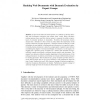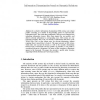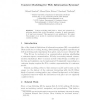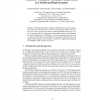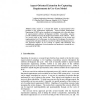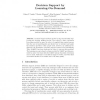CAISE
2003
Springer
14 years 4 months ago
2003
Springer
CAISE
2003
Springer
14 years 4 months ago
2003
Springer
Abstract. Information systems engineering for design or knowledge communities is characterized by the fact that these communities constantly monitor themselves and initiate repair ...
CAISE
2003
Springer
14 years 4 months ago
2003
Springer
Abstract. In spite of the wide use of the Internet, it is difficult to develop desirable web documents evaluation that reflects users’ needs. Many automatic ranking systems have ...
CAISE
2003
Springer
14 years 4 months ago
2003
Springer
In this paper we present the design of an environment that offers personalized, ubiquitous information services in the emerging integrated world of the digital-TV and the Internet....
CAISE
2003
Springer
14 years 4 months ago
2003
Springer
In a selective information dissemination (SDI) system, users submit profiles consisting of a number of long-standing queries to represent their information needs. The system then c...
CAISE
2003
Springer
14 years 4 months ago
2003
Springer
Context modeling shall lead to better aid customers in achieving intents that evolve throughout a session. A static approach to it has been proposed. This approach is not satisfact...
CAISE
2003
Springer
14 years 4 months ago
2003
Springer
Abstract. Checking requirements is highly desirable but hard to achieve in practice, where only word processors are used in most projects. While in this case reviews are more or le...
CAISE
2003
Springer
14 years 4 months ago
2003
Springer
Early Aspects is a concept that applies an aspect-oriented (AO) paradigm to the requirements engineering. Aspect-Oriented Requirements Engineering (AORE) can be considered as an im...
CAISE
2003
Springer
14 years 4 months ago
2003
Springer
This paper describes view generation and view optimisation in the AutoMed heterogeneous data integration framework. In AutoMed, schema integration is based on the use of reversibl...
CAISE
2003
Springer
14 years 4 months ago
2003
Springer
Abstract. Decision-support systems provide a large functionality supporting the decision making process. They allow to draw conclusions from data provided by users. In order to be ...

